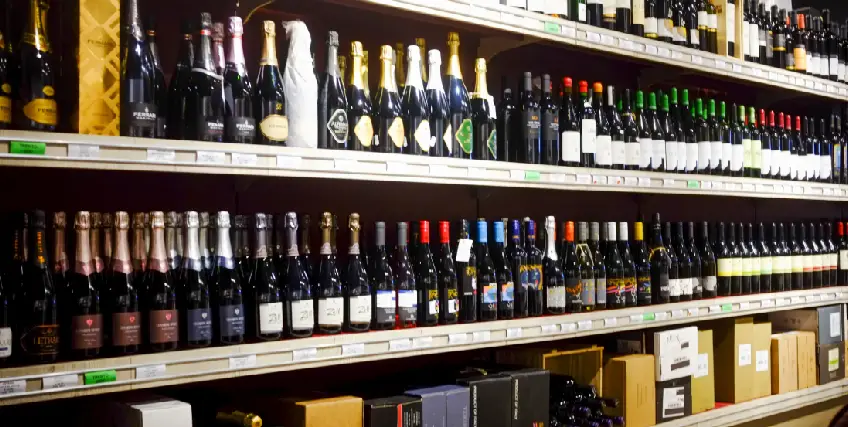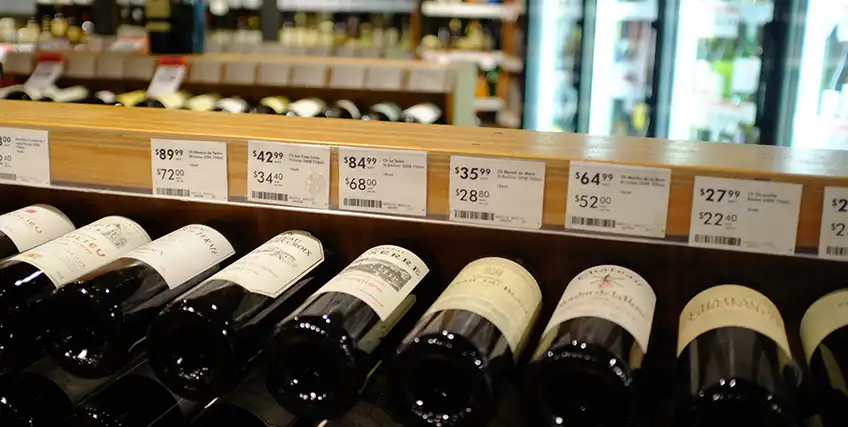How to Use a Business Loan to Expand Your Liquor Store Inventory
April 15, 2025 | Last Updated on: April 15, 2025

Like most retail businesses, liquor stores have to maintain a healthy inventory to ensure they provide an adequate selection for new customers and meet loyal customers’ demands. While there are many business demands that may make you want to explore liquor store financing, few are as pressing as inventory.
Alcohol inventory is expensive, and liquor store owners need to retain flexible cash flow to keep operations smoothly. One of the best ways to balance your present working capital demands and ensure your inventory is fully stocked is with a liquor store business loan.
In this article:
- Types of small business loans can finance your liquor store inventory purchases.
- Explore alternative financing options to help you purchase inventory.
- Learn how to choose a liquor store business loan lender and apply.
Why Do Liquor Stores Need Financing?
Although IBISWorld's Beer, Wine, and Liquor Industry Report found that the liquor industry generated $79.9 billion in annual revenue worldwide and has expanded at a CAGR of 2.2% over the last five years, it’s not all sunshine and roses. Biz2Credit’s first Small Business Earnings Report of 2025 found that American businesses reported smaller earnings and are struggling in a sluggish consumer economy.
While liquor stores are relatively recession-proof, high inflation and lower consumer confidence may force you to tighten your spending in the short term. A liquor store business loan can support your business in lean times in several ways, including:
- Acquiring new inventory or stocking up on high-demand products
- Expanding into a new location by opening a new store or improving your existing one with renovations
- Business acquisition of a competitor liquor store
- Subsidizing pricing cuts that incentivize your customers
- Refinancing or consolidating other loans
Entrepreneurs who are tight on liquid cash may find that liquor store loans offer a host of benefits and support many business needs.
Types of Inventory Financing
Liquor store owners have many loan options available to them, but not all may be used to purchase inventory. For instance, equipment financing must be tied to a piece of equipment and commercial real estate (CRE) loans must be used to finance real estate purchases. (Although you may be able to use a CRE loan to purchase an existing liquor store as well as its current inventory.)
While some loans have restrictions, these financing options can support your liquor store’s inventory needs.
Retail inventory financing
Inventory financing is a short-term loan or line of credit that business owners may use to purchase inventory, which is then used as collateral to secure the loan. The loan amount you may qualify for depends on the value of the inventory you need to purchase, as well as your financial eligibility, like your credit score and annual revenue.
Inventory financing is a great startup loan for new liquor store owners since you typically need fewer financial statements to qualify since the loan is secured by the inventory itself. Just bear in mind that you will need to prove you have a liquor license and if you fail to repay the loan, you’ll forfeit the inventory.
Term loans
Term loans are conventional loans in which a lender pays you a lump sum upfront in exchange for a monthly repayment schedule based on an interest rate. A reliable, flexible financing option, term loans can be used for virtually any business need, including purchasing inventory. With predictable monthly payments, you can make the purchases you need now and budget to repay the loan over time.
SBA loans
The U.S. Small Business Administration (SBA) offers several loan programs. These loans are partially guaranteed by the SBA, lowering the risk to both borrowers and lenders. The most common program, the SBA 7(a) program, offers loan amounts up to $5 million for qualified applicants, which you can use for inventory and many other business purposes.
Be aware, however, that SBA loans tend to have strict eligibility requirements and may be difficult for new business owners to qualify for.
Working capital loans
If you’re short on cash flow but still need to re-up on inventory, a working capital loan may be a good option. These short-term financing options tend to be easier to qualify for than traditional term loans, although they often have higher interest rates. Nonetheless, if your liquor store needs inventory, a working capital loan can give you the quick infusion of cash your business needs.
Business line of credit
A business line of credit is like a cross between a bank loan and a credit card. A lender approves you for a maximum loan amount, but you only pay interest on the amounts you withdraw to make purchases. Liquor store owners can use a line of credit to purchase inventory when needed and then repay the borrowed amount as they sell through the inventory. With a revolving line of credit, you’ll have access to the full loan amount after you’ve paid back what you borrowed.
Merchant cash advance
A common solution for business owners with bad credit or in need of very fast funding, merchant cash advances (MCAs) are commercial arrangements in which an MCA provider gives a business an upfront payment in exchange for a percentage of future credit card sales. Since they’re facilitated between two businesses, these are not loans.
Functionally, however, MCAs do look a bit like loans. You can use the funds for any liquor store needs, including purchasing inventory. The key difference is that the repayment schedule isn’t set. You’ll pay daily or weekly installments to the MCA provider based on your sales during that period. The more you make, the more you pay, and vice versa. The full repayment amount is determined by a factor rate.
MCAs can wind up being much more expensive than a conventional loan with an interest rate, but they often have a faster application process and funding times.
Revenue-based financing
Liquor store owners may experience fluctuating sales throughout the year. With revenue-based financing, you pay based on a percentage of estimated future receivables. You can use this type of financing to purchase liquor store inventory and address a range of other needs.
Where to Find Financing Options for Liquor Stores
We’ve broken down a few small business funding options here, and most of them are available from both traditional and online lenders.
Since the COVID-19 pandemic, alternative lenders have carved out a larger market share due to a greater willingness to work with businesses that banks and credit unions consider too risky. Still, there are advantages to working with traditional financing institutions, too.
The advantages of banks and credit unions include:
- Higher loan amounts
- Lower interest rates
The advantages of online lenders include:
- Lower eligibility requirements
- Faster loan application process
- More flexible loan programs and repayment schedules
In today’s market, liquor stores could benefit from either resource, but many traditional financial institutions may see the liquor industry as too volatile to offer term loans or SBA loans. Whenever you’re looking for liquor store business loan lenders, you should always explore many options to find the right fit.
Final Thoughts
Whether you’re still in the business plan stage, working to refinance existing debt, or you just need an influx of cash to re-stock inventory, liquor store business loans can help. Some traditional lenders may be reticent to work with liquor stores, but there are plenty of alternative lenders that are willing to do so. With these financing solutions, you’ll be able to purchase the inventory you need to keep your business thriving.
FAQs
Can liquor stores get loans?
Liquor stores can get loans, but some traditional banks or credit unions may be more resistant to working with them due to the competition and potential inconsistency of liquor store revenues. Alternative lenders are usually more willing to work with liquor stores.
Will SBA finance a liquor store?
SBA lenders will work with liquor stores, provided they can meet eligibility requirements. You’ll need to show proof of a liquor license, financial statements, tax returns, and pass a credit check, but liquor stores are not on the SBA’s list of excluded businesses.
What are the best financing solutions for liquor store inventory?
There are many good options to finance inventory purchases, including retail inventory financing, term loans, SBA loans, business lines of credit, and merchant cash advances.
How profitable is owning a liquor store?
Liquor stores can have great profit margins. However, this largely depends on multiple factors including demand, suppliers, and inventory.
Should I work with an online lender or a traditional lender?
There are pros and cons to both. Generally, traditional lenders have stricter eligibility requirements and may be less willing to work with liquor stores. However, they usually offer higher loan amounts and lower interest rates. Online lenders may have more flexible loan programs and repayment schedules, have less stringent eligibility requirements, and offer faster funding, but typically at the cost of higher interest rates. Ultimately, the best liquor store business loan for you depends on your situation.




